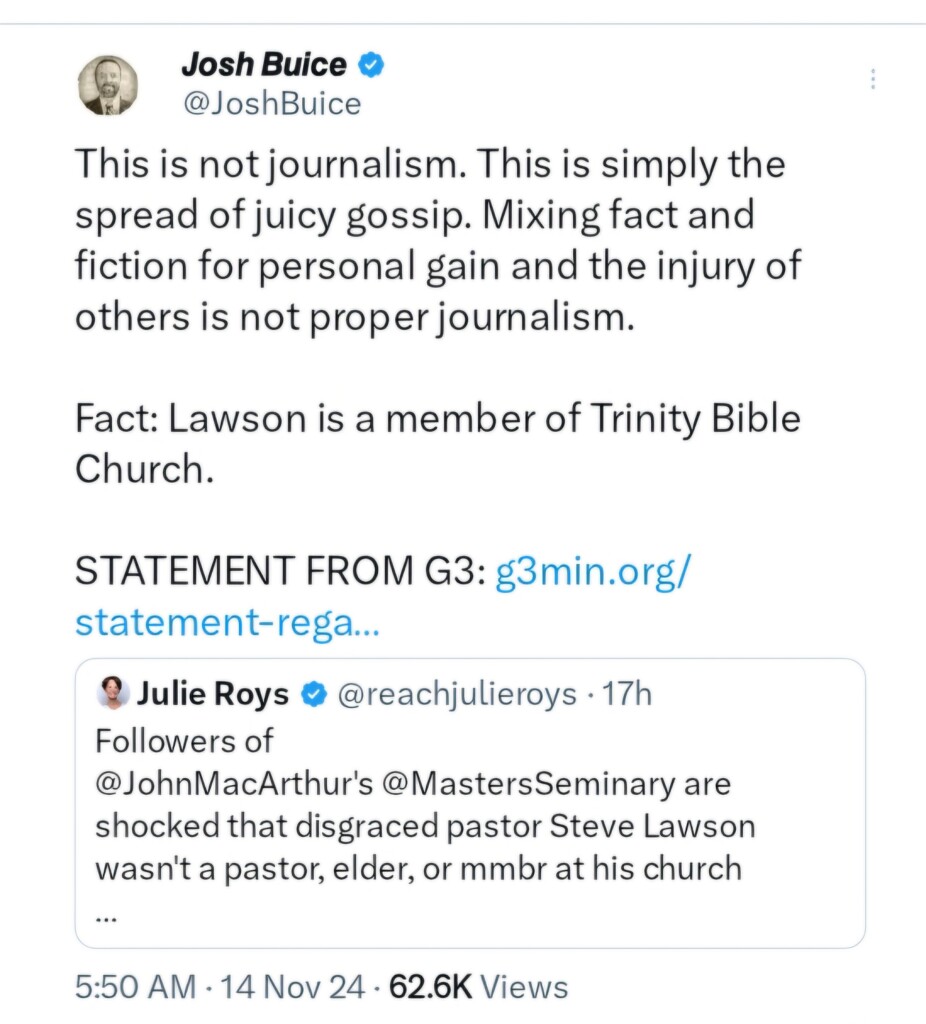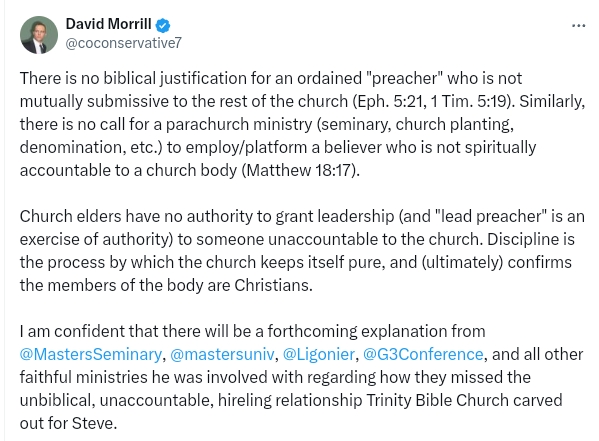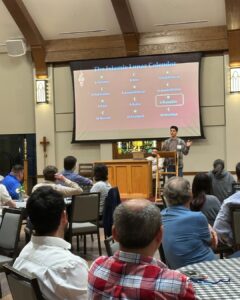While “rubbing salt in the wound” often refers to needlessly adding pain, the origins of the phrase come from rubbing salt into a wound to prevent infection. It hurts, but it protects. Such is my desire with what follows.
The aftermath of Steve Lawson’s fall is proving an excellent opportunity for edification, particularly edification related to public/parachurch ministries interested in serving local churches. Indeed, unbiblical ecclesiology allowed Lawson to act as a functional apostle rather than a pastor, microwaving an egg that exploded all over the faces of those who platformed him.
Protestia recently reported allegations that Lawson was not an elder/pastor nor a member of Trinity Bible Church but a hired preacher with special permission to preach on Sunday while avoiding inconvenient stuff like pastoring. This information was reported by other outlets, confirmed by our sources, and fit in with the small amount of public information released by the church – for instance, the church listing Lawson as the “Lead Preacher” rather than “Lead Pastor,” “Preaching Elder,” or something more analogous to the biblical office assigned to the other men in church leadership. An additional red flag was the With All Wisdom podcast (quoted in Protestia’s reporting) learning from TBC staff that the church was not handling the Matthew 18 discipline of Lawson – one of the primary components of actual church membership.
G3 Statement
It took similar information being clumsily reported nearly a week later (with requisite MacArthur smearing) by Julie Roys writer Ann Marie Shambaugh to draw the ire of G3 Ministries president Josh Buice, who condemned the Roys article on X with a provided link to a longer statement and accompanying YouTube video and transcript responding to the claim that Lawson was not a member of TBC.

Buice’s statement describes, “various reports, articles, and podcasts were released that purported the idea that Steven Lawson was not a member of Trinity Bible Church” that “add[ed] salt to already open and very sensitive wounds” before taking issue with reporters who had “openly critiqued [G3 Ministries] for [their] willingness to platform someone who was not a member of a local church.” For Protestia’s part, we did not critique G3 for not vetting the relationship between Lawson and his church. This oversight was entirely understandable, and upon learning about Lawson’s sin, G3 took swift and appropriate action. We expressed our confidence that G3 and other trustworthy ministries would similarly reiterate that church membership was a requirement of public Christian ministry and apologize for the (again, understandable) assumption that a church would never platform a preacher who was not an ordained elder and part of the covenanted membership of the church.:

Buice’s statement indicates that G3 confirmed through “two sources within Trinity Bible Church” that Lawson and his wife were indeed members of the church, describing reporting done to the contrary as “rumors” and “false accusations” that “spread like a destructive wildfire.” The “podcasts and polemics websites” remained unnamed in the statement despite Protestia being the primary “polemics” site that reported the information. While not naming Protestia in the video, Buice responded to several social media commenters linking our article, waving it off as “false information.”


The ensuing exchanges brought about a wave of accusations not dissimilar to what G3 unfairly faced for not knowing about Lawson’s lack of eldership and membership.


The “false information” is apparently our determination that Lawson was not a church member, as no attempt was made to dispute the (more serious) claim that TBC had a non-pastor or non-elder preaching their Sunday sermons. Given the various definitions of “membership” employed by evangelical churches (and TBS’s elders being the determiners of “membership”), whether or not Lawson was a member is entirely subjective. Most tellingly, the reporting that TBC is not disciplining Lawson is defacto proof that he is not a member in any real sense, no matter what anyone calls it.
Is it plausible that a church would employ one of its members as the primary Bible teacher apart from the requisite spiritual authority of biblical eldership? Can G3 or any other ministry point to another biblical church with a similar ongoing arrangement? More importantly, can any of us defend such an arrangement from scripture?
The chance that Dr. Steven J. Lawson willingly agreed to operate beneath the authority of other men – particularly other men willing to exempt him from actual pastoral ministry – doesn’t even begin to pass the proverbial smell test. Yet Buice seems willing to accept that a church that farmed out its elders’ biblical duty to a non-pastor celebrity preacher is a reliable source on the preacher’s status as a church member.
Why would G3 stick its neck out to defend TBC? First, churches should be defended. Lawson’s sin was no doubt devastating to the church, and the headline “he wasn’t even a member” casts both on the church’s eldership and the polity that permitted such a lack of accountability. Second, it could be a simple case of reputation management. Yet certainly they had nothing to fear from Protestia, who cast no shade at all towards G3 or other faithful ministries that platformed Lawson. The answer lies in several public statements from G3 and the statement of faith from Trinity Bible Church.
“Sub-Church” is Sub-Biblical
Josh Buice consistently refers to G3 Ministries as a “sub-church ministry” rather than a “parachurch” ministry. A parachurch ministry (Protestia, for example) is a ministry that exists alongside local churches and is made up of members of local churches and the universal Body of Christ. In the spirit of the priesthood of all believers and the Reformation conviction that all believers have an equal right and responsibility to minister in the name of Christ, parachurch ministries/ministers are the church. Like all good Baptists, G3 understands that there is no such thing as “clergy” and “laity,” biblically speaking. Yet, they insist on a similar categorical divide by describing “the church” (read: pastors/elders) to which all other believers must submit.
Yet aside from the mutual submission believers owe to one another (Eph. 5:21) and the trust we demonstrate for our local church elders (Heb. 13:17), the idea that individual believers engaged in parachurch ministry are called to submit to “the church” as a mediator is a magisterial holdover that strikes at the heart of the Reformation itself. Within a proper understanding of the priesthood of all believers, “sub-church” could better be understood as “sub-pastors,” as Buice and others insist that all “sub-church” ministers submit to elders categorically as spiritual leaders over them. Yet just as the biblical requirement for wives to submit to husbands doesn’t mean every wife must submit to every husband, believers are not required to submit to every elder – only the elders they have agreed to submit to, and only in the context of the elder’s ministry of the Word and overseeing of the gathering.
TBC’s Ecclesiology
Trinity’s statement of faith and vision & mission assign broad authority to the elders, describing them as serving “under Christ and over the assembly,” stating that they “have Christ’s authority in directing the church,” with the congregation being required “respect and obey” them. to submit to their leadership. Church discipline is “exercised by the elders” against “sinning members of the congregation.” The elders “determine all other matters of membership, policy, discipline, benevolence, and government.” Although they list “mutual accountability of all believers to each other,” elders are described as “subject to Christ” in a reinforcement of their position “over the assembly.”
By this ecclesiology, TBC elders would be entirely permitted to hire a “lead preacher” who had no responsibilities as a pastor/elder and modify any component of “membership” they see fit, including (quite possibly) having different standards of accountability for Lawson and the rest of the church if they saw fit.
Was Protestia (and many other outlets) right that Lawson was not a member? Or is G3 right that he was and that suggesting he wasn’t is sinfully damaging? Since Lawson was not an elder, TBC is not disciplining him, and their polity allows “member” to be redefined at any time, what difference does it even make?






















52 responses to “Rubbing Salt in the Wounds”
Excellent brother. Just excellent.
Ironically Buice is doing the same thing that he is accusing others of doing. Taking his word for it that Lawson is a member, is, by his own words, no more credible than others claiming that Lawson isn’t a member. Oddly enough, G3 took for granted that Lawson was both a pastor and a member of the Church, and under authority from his supposed elders. G3 and other celebrity pastor conference organizations shouldn’t presuppose their celebrities accountability/status in the local church. His statement was damage control.
Consider what the Bible says about the concept of “membership”. Firstly, and most importantly, it applies to the church universal, not to a given congregation, and not to any list of names on any paper in any office of any church building. In the context of Matt. 18, the local church was the one synagogue in the town. If you were a Jew in that town, you were a member. In the context of 1 Cor. 5, it was also the local town. As the directive to be separate, given in 2 Cor. 6:16-18, is drawn from Old Testament scripture. The context applies in both cases. Essentially the local church was the town, and the town was the local church. And there were not forty zillion different buildings along main street for forty zillion different denominations. One town, one gathering place, one congregation. And that context is important.
From a Biblical standpoint, then, if you are a truly born again Christian, then you are a member of the local church universal, whether or not your name is on a piece of paper. Confusion arises when we try to apply scripture to structures and organizations created by mankind. And God is not the author of that confusion. We are.
Some, it seems to me, would prefer to wrongly try to apply Matt. 18, which is about trespasses between brothers, not because of a question of discipline, but because there is a desire for restoration, possibly even restoration to ministry, in direct violation of scripture. If the correct punishment is applied, as prescribed in 1 Cor. 5, then he is to be essentially banished, disassociated, and permanently disqualified. (which in context, both Biblical and historical, basically means to run them out of town) Yet some, it would seem, don’t have much desire to do things the way God says to do things, in this case, possibly because they want to see him restored. I don’t know why else anyone would be wrongly trying to apply Matt. 18, which is not about egregious sins against the Lord and the entire church universal, which only God has the authority to forgive. If mankind can discipline, then mankind can restore. Yet the Biblical approach in this case is to follow 1 Cor. 5, at universal church scope (not just the town, but global universal church worldwide), and leave the punishment up to the Lord, knowing “the Lord will repay”.
Wow, you are soooo wrong!!
Certainly could be. But if that’s the case then show me the scripture to correct me …
Your reaction doesn’t surprise me, Scott, because it goes against much of what you have been taught. I challenge you to consider what the Bible actually says. To set aside tradition. To not teach for doctrine the commandments of men (Matt. 15:9), as the Pharisees did. But to consider what God has actually said and commanded.
It is very worthwhile to step back, take pause, and consider what the scripture actually has to say about things such as the concept of “membership”, in the first place.
It speaks to what I call “churchianity”. It can become a worship of the creation rather than the Creator. As if the church is Lord and Savior of mankind.
One thing is absolutely certain. Come judgment day, we’ll all find out who was a member and who wasn’t. As any and all of Jesus teaching, should be considered in the context and message of His entire ministry, which began with “repent, for the kingdom of Heaven is at hand” (Matt. 3:2), continued with it (Matt. 4:17), has never changed, and never will change.
We’ll all find out the definition of “membership” …
And that is not meant to accuse any and all involved in the debate. Some may just be a bit too carried away with the theological discussion, and so on, in a bit of nerd-like fashion. We like to debate what the Bible says about things, and that’s a good thing. It’s iron sharpening iron. But we also must remain sober, and be sure not to get too far off track to the point where we miss the forest for the trees.
The comparison has been made to the organization structure of the family. And there are a few things to note about that also. The first and foremost of which is that in instances of porneia, the prescribed response is divorce. Just as the church should “divorce” him, per 1 Cor. 5, his wife probably should also. As we all understand, as soon as a husband and father fails to submit to the Lord, then at that point all the organizational structure of the family is thrown out the window. Neither the wife nor children are obligated to follow or obey, if he himself is not in obedience to the Lord. So in both cases, divorce is the prescribed punishment. And it should be carried out without pity or compassion.
Which is another problem all to prevalent these days – the compulsion to have compassion and pity for those who suffer the consequences of sin. God’s word specifically instructs us not to do that. When He tells us “your eye shall not pity”, that’s exactly what He means. Don’t do it.
If you’re going to discipline as the Bible instructs, then that’s what must be done. Divorce him from the church. His wife should also dump him. And no pity or compassion should be shown. These are not the times for weakness.
T,
interested in your take on church membership. I would like to dig a little deeper on this perspective (i. e. it is universal not just name on a local church role)
Wonder if you might share some favorite posts, books, articles, etc. that have helped your understanding.
rgds
E
Just the scripture, my friend. About the only thing I can think to add at this time, would be to reference back to Acts, to substantiate the fact that the early church separated themselves and formed their own towns. And I use the word “town” because I can’t think of a better word to describe it, at this time.
If we are to apply scripture, then it about boils down to whether or not any concept of a local church roll is necessitated. And it clearly isn’t. At that time, it basically referred to whoever lived “among them”. We’re basically asking the question whether or not somebody made a list of the names at the local level. Well, who knows. Probably not. But whether they did or didn’t, as Mr. Morrill asks at the end of the article here, what difference does it make? None whatsoever.
As it pertains to the subject at hand, I don’t understand why many are of the notion that something must be done to Larson, to discipline him somehow. I don’t see that in scripture, as it applies to this case. The prescribed punishment is basically excommunication. Right, 1 Cor. 5 doesn’t say “deliver him to the church over in the other town”, or “let the church over in Ephesus associate with him, but not you.” The punishment was to be universal. He was to be delivered to Satan, to the world. The admonition then is universal. It applies to the church universal. Well, Larson is already excommunicated. So that’s it. Case closed. Nothing more needs to be done, aside from continuing disassociation. It seems to me that “the Lord will repay” is a sufficient response, since, the ultimate discipline and determination of true membership in the Lord’s church will be determined on Judgment day.
What is this alternative discipline that some seem to want? What do they want TBC to do to Larson? They say he needs to be disciplined. How so?
There’s a danger with getting too carried away with church discipline. It’s not good to have none. It’s also not good to have too much. Right, the most egregious instance of church discipline in the history of mankind was when the church delivered Jesus to the Cross, which was in their mind a matter of church discipline. I’m not saying there are parallels to this case, because Jesus was sinless, and Larson certainly isn’t. But the church should be careful, remain sober, and remember that it is not the savior of mankind. There are times when we have to just say “the Lord will repay” and leave it at that. Larson now is (or should be) a part of the world, not a part of the church, and God will judge the world.
I don’t have the answers. I could be wrong. All I’m saying is that if we are going to apply scripture, then we need to apply all of it in context. And I’m fairly certain that this is not a Matt. 18 sort of situation.
As to the question of whether or not there are other resources, or expertise, or any sort of consensus, and so on, as if I’m only repeating what someone else said, my only response is the scripture, yet again …
“For consider your calling, brothers: not many of you were wise according to worldly standards, not many were powerful, not many were of noble birth. 27 But God chose what is foolish in the world to shame the wise; God chose what is weak in the world to shame the strong; 28 God chose what is low and despised in the world, even things that are not, to bring to nothing things that are, 29 so that no human being might boast in the presence of God. 30 And because of him you are in Christ Jesus, who became to us wisdom from God, righteousness and sanctification and redemption, 31 so that, as it is written, “Let the one who boasts, boast in the Lord.”’ – 1 Cor. 1:26-31
If the sins are against the Lord, and they are not sins that we have the authority to forgive, then Matt. 18 essentially jumps immediately to the point of “tax collector or gentile”, to the point where he is no longer considered a brother, because even the church cannot forgive what only the Lord can forgive. Matt. 18 is about reconciliation. It is not about sins where the scriptural response required is specifically to not reconcile. If we’re commanded not to reconcile, in a given case, then no scripture pertaining to reconciliation would apply. (as I see it) And it applies to the entire church universal. Just as the Master’s Seminary properly cut ties, and were correct to do so. As should all. There is no scripture anywhere that says it should only apply to the local church, as if the church down the road doesn’t have to honor it. No, it applies to the entire church universal.
And it is because of that universal scope, that the response must be that which is prescribed by scripture, for the sin or sins in question. If the church is going to discipline, then it needs to be for specific sins, as evidenced by two or three witnesses, with diligent inquiry, and then the prescribed response applied, according to scripture. Otherwise, nobody is obligated to honor it.
If the elders of TBC were to impose some sort of discipline not prescribed by scripture, in an effort to reconcile, then what are they going to do when someone holds up 1 Cor. 5 and says, “no, I’m not going to obey an unbliblical mandate”. Nothing, because they couldn’t. What are they going to do, deliberately go against scripture? This is why just as the organization of the household, the organization of the church, and so on, only holds up when those who lead are fully submitted to the Lord and to doing things the Lord’s way. If not, then it all falls apart. If the leaders are not fully submitted to the Lord, and to doing things His way, then nobody has any obligation to obey or follow a word they say. And in fact, shouldn’t obey.
So what is this alternate discipline some seem to want?
You know T, for someone who says they don’t have all the answers……. You could have fooled me.
If the scripture isn’t followed, then what ends up happening is that those who hold to it are the ones who end up being disfellowshipped. They are the ones who end up being weeded out. Fast forward another five or ten years, and the church will be celebrating and affirming abominable sin, which is what has happened to many churches already. Those who believe and follow the scriptures become unwelcome, and those who don’t are sitting in the front pew and standing behind the pulpits.
Certainly those on the rosters of those churches, and on the rolls of many others, are not truly born again, and are not a part of the universal church – which the Baptist confession affirms is the “invisible” true church.
There shouldn’t even need to be any discussion about whether or not a church roll is relevant, especially here at this website, of all places. It isn’t relevant. It won’t be relevant on the day of judgment, and it is not relevant now. The only roll that matters is in the Lamb’s Book of Life.
Hey, I have some questions below. Some serious, some the opposite of serious
Like clockwork, lo and behold here comes VanityOfVanities to eagerly affirm exactly what my previous post stated. Those who seek to hold to scripture are the ones who end up being disfellowshipped …
Hey, I have some questions below. Some serious, some the opposite of serious
Good article
T,
What happens if a member of the Ephesian church is excommunicated, but then moves to the Ethiopian church? Pretty large distance. How will the Ethiopian church know of the universal excommunication (prior to the interweb) of the former Ephesian member? Wouldn’t they now be unintentionally leavening the lump?
Or, what about this more modern example, assuming the one-town, one-church approach: Let’s say Sam is excommunicated from the church in Memphis and joins the church in Nashville. Let’s say the elders in Nashville have come to a different conclusion on Sam’s status among the Church (maybe they question the testimony of the witnesses, or view the sin as less egregious, or whatever reason). What if the elders in each town disagree and the Nashville Christians now associate and worship with an excommunicant from Memphis? What should be done?
Wouldn’t Baptists need a hierarchical form of polity for any of this universal excommunication “to stick”across independent congregations, even if they are “town” churches (which sounds good to me, btw; though I’d argue this is descriptive of Acts, not necessarily prescriptive; that is, Paul never writes: “One town may have only one assembling of its members for worship, regardless of the town’s size”).
One way, perhaps, would be to brand Sam on the arm or forehead? Maybe chop off his ear or a finger? But what if he repents later? There’s no restoring a missing digit. But maybe if we engrave an E (for excommunication) on Sam’s head, perhaps we can just box the lines in as a square in case of repentance/restoration?
Ok, the last bit was my sad attempt at humor. But my original questions are serious and offered sincerely! I definitely agree we should follow Scripture over traditions. And , like what’s his name above, I’ve also never heard of your approach to membership, at least not exactly the way you described it. Interested to hear more!
Oh, and if we do choose to brand or maim Sam, what other options would you recommend? The “E” thing was just off the dome, and I know we can do better. Oh, and what if Sam is a serial heretic like Servetus and jumps from town to town? That probably would’ve ended badly for Servetus!
Chris, I will ignore the fact that your attempt at humor is more a matter of ridicule and mockery. Not of me, as much as the practicality of following God’s word, when it is not for us to question Him on the grounds of what we believe to be practical or not.
In the Baptist church, at least those I’m familiar with, there are two ways to become a member. One is a statement of faith. A testimony that is expected to be honest. Another is by letter. If you move from one town to another, and you go to join a local church in the new town, you can request that a letter be sent by your previous church to the church you wish to join.
Believe it or not, mankind did just fine before the old “interwebs” came along, and had ways of getting things done, communicating, conveying and verifying information. Most of our New Testament consists of what? Something called “Letters”. A strange thing of the past that the younger generation, which spend nearly every waking hour glued to the screen of an iphone, knows nothing about.
You don’t very well need to brand anybody, when a simple transfer of letter will work just fine, and if no letter is available, then a verifiable testimony. It’s been done that way for hundreds of years, and it is still done that way.
So you see, your attempt at ridicule falls a bit flat here, considering that’s exactly what Baptists have been doing for as long as Baptists have existed. Why? Well, because, as I stated, the Baptist London confession of 1689 recognizes the existence of the true “invisible” universal church. And because church discipline, as that described in 1 Cor. 5, does indeed apply to the entire church universal.
Don’t quit your day job …
Ouch! I sincerely did not mean to offend you, which I thought I clearly explained as a poor attempt at humor. Actually, it was an attempt to push your idea to its logical extreme (reductio ad absurdum, I think). Also, for iron to sharpen iron, it’s probably not helpful to accuse a complete stranger of ridiculing the Bible (IMO). Is questioning your opinion on local church membership or universal excommunication “making a mockery” of God’s Word, Apostle T? That’s another joke, so chill, and let’s be fair. I have some questions:
Your second paragraph speaks of joining a church by statement of faith and by letter. These are true. But how does your Town/Church receive that person’s statement of faith? Is it a public address to the assembly? Is it baptism? Is it the vote of the local body (we’re Congregationalists after all)?
The reason I ask is because as soon as the congregation has received the statement of faith/baptism and approved it together as a local Body, you immediately have a church “roll.” It doesn’t always have to be a formal list, but it can be, and historically has been. This is in no way claiming that a church “roll” is more important or accurate or whatever than the Lamb’s Book of Life, as if the latter prohibits the former.
Like the statement of faith/baptism, our agreement about church letters supports formal local church membership. I was surprised to hear you mention church letters at all, given your aversion to having members’ names on paper. But let’s focus on the church letter. I’d argue that in the NT, the letter was given to an individual Christian who/whom(?) was leaving one town for another; it was then presented to the new Church/town when he/she then joins. I could be wrong here, but it’s really beside the point. Let’s assume the churches in Acts used the same practice most Southern Baptists use today. The process is usually this: Our fictional member Sam moves to a new town and asks to join its membership (not sure if you’re arguing against or for this practice). The Church then sends a letter to original church requesting a letter of verification/baptism/membership (whatever). This is what I’ve seen personally among most Baptists, at least in the South (I’m a redneck).
These church letters not only support the concept of a formal local church membership (assuming these letters actually mean something and are received/approved by the local, receiving Church), I’d point out that none of this applies to Sam. He’s been excommunicated, bro! His statement of faith has been rejected by the Body; he has no church letter.
So again, how can universal excommunication even be possible? (You may not like the word “practical” when it comes to ecclesiology (I usually don’t), but the word itself is not sinful, nor is the concept. I only mean to say that God has not commanded the impractical when it comes to church membership). Do you really think Sam is going to mention his excommunication when he moves from Ephesus to Ethiopia (or from Antioch to Rome, etc.). The church has already rejected his profession, so why should we assume Sam is a honest person? What if he was actually excommunicated for reasons involving outright deception/dishonesty? See what I’m saying? Why would Sam not just completely fabricate his past and his faith when moving to Ethiopia? Or couldn’t he just join by statement of faith? How could the Ephesian church ever even know this former member moved to Ethiopia?
Perhaps excommunication could be flawlessly upheld by numerous churches in close proximity to each other. But once the geographical distance becomes great enough, there’s no way for the Universal Body to uphold/recognize the excommunication enacted by a local Body far, far away.
Btw, that’s all I meant about the interweb. Maybe you could track the movement of a member over long distances today via social media/internet. Maybe not? But the Church definitely had no way of doing this prior to the internet. So yea, I’m completely aware that the ancient world got along just fine without the internet. Thanks for the help. But one thing they didn’t/couldn’t do is track the activity of excommunicants across vast distances. In fact, this is probably how many wolves have actually snuck into local Bodies! You think they stop being wolves when one local Church expels them?
Again, all of this screams for formal membership, which is ironic. Literally the only way to truly enforce Universal Excommunication would be for local churches to have the most accurate records ever of who belongs and who doesn’t belong to their Body (ie a church roll)! And thanks for explaining epistles/letters too! What are you even talking about, man?!? The “verifiable testimony” of an excommunicant? LOL.
So you can quote my favorite confession all you’d like. The dudes who wrote it practiced local church membership while also recognizing the existence of the Church Universal, yet never once proclaimed that excommunication could practically be enforced universally.
Before I go back to my day job, which I may actually quit soon (lol, hope I don’t starve!), I’ll need to look at your other posts real quick. I’ll try not to question too many of them and thus avoid blasphemy.
Chris, nowhere, at no time, have I remotely implied that I am against individual church membership and membership rolls. That is not anywhere close to anything that I’ve said. I have nothing whatsoever against church membership rolls. You have misunderstood.
Aside from that, I’ve already made my case. If you don’t agree, that’s fine. You don’t have to agree.
I mean, it’s pretty close, lol.
Right, I don’t have to agree. And my disagreement with your opinion is neither mocking God’s Word nor denying God’s omnipotence. Just so we’re clear…
But that does remind me of what we know about Larson. TBC knew that he had trouble in the past as a pastor. Church’s split, and so on. Now maybe we have a better idea why. And so TBC agreed to just let him be a speaker but not a pastor.
The church elders severely erred. As those are very questionable, if not disqualifying, red flags by themselves, aside from whether or not he was a formal member on the church rolls. As soon as a candidate says he doesn’t want to be a pastor because of prior conflict, that’s a major red flag, and the elders have a duty to look into the matters fully. If what has been reported about the situation is true, then Lawson shouldn’t have ever been hired in the first place.
No need for anybody to tattoo anything on Larson, when the church already had enough red flags as it was, but went ahead despite them.
I guess I should make this clear (again), T: I don’t actually believe anyone should be branded or maimed! And nah, man, I didn’t mean nothing about the mark of the beast.
Yes, God is Almighty! I agree. Are you saying anyone who disagrees with your opinion, which you’ve already stated is indeed your opinion and not an inerrant interpretation, is guilty of denying God’s authority/sovereignty? Give me a break, man!
The very fact that you keep saying, “Only the Bible, only the Bible” is sort of odd for two reasons: first, you keep quoting a confession instead of the Bible! Are you a confessionalist or not? If so, what confession teaches against formal local church membership? Also, what Scriptures support your views because I haven’t seen any yet?
Second, you imagine the “If scripture says it, then I don’t question it” makes you sound orthodox and all, but it’s precisely the problem here. You’ve admitted that no one you know of from church history advocates your views! You said there’s no book, article, etc to turn to except Scripture (This is not the view of Sola Scriptura as held by the Reformers, nor by the 1689, which makes me wonder why you keep bringing it up). Ok. Do you mean, then, that the Holy Spirit has now, after 2,000 years of Church history, finally revealed the true doctrine only to you? The very fact that you can’t cite any others is proof that it’s novel and therefore just your opinion. Unless you have access to some secret knowledge.
Are you an ecclesiological Gnostic, Mr. T? Cuz I pity the fool who argues “Bible only,” if what they actually mean is “My opinion, which no other Spirit-filled Christian that I know of, past or present, has ever held, is authoritative and not to be questioned. To do so is to ridicule the Bible.”
Chris, I specifically stated the opposite. That God’s word is the authority, and not me or my opinion. Which is why I specifically told you that you can correct me WITH SCRIPTURE.
All that I’ve said is that it is the scriptural definition of the church that is the definition that matters. If you’re talking about church discipline, then you’ve got to know and understand what constitutes the church, according to scripture. On that much, we should be in agreement.
How many churches were in Rome? ONE
How many in Ephesus? ONE
How many in Corinth? ONE
How many in Philadelphia? ONE
Get it yet?
I’m not going to bother responding further …
So just completely ignore my questions then. And I already assumed your one church, one town position. I disagree with it, but it doesn’t help your arguments regarding universal excommunication or that the Lamb’s Book of Life somehow makes church rolls unimportant. Yea yea, agree to disagree (which is a bit less than blasphemy, agree?). So I say T for truce! Is that agreeable? Peace!
NO CHRIS, I did not say that church rolls are unimportant.
The subject at hand here is CHURCH DISCIPLINE.
The question is WHAT CHURCH.
If you’re going to apply church discipline according to scripture, then it must be according to the scriptural definition of the church – which is the “invisible” one true universal church, the Bride of Christ. It is not a single building on a single street corner of a certain denomination.
That is NOT TO SAY that there is anything wrong with individual church membership rolls. Only that the scope of DISCIPLINE is not defined or limited by those rolls.
You are severely falsely accusing me here.
When it comes to honoring God’s word, we just don’t start asking “but what if …” this and “but what if… ” that
He’s almighty God.
As I stated to earlier posters, Chris, if I’m wrong then you can correct me with what?
… with scripture
Not with ridicule. And not even with questions of practicality. Who am I to tell Almighty God what is and is not practical? If the scripture says it, the scripture says it. And I don’t question it.
T, just stop man. Church discipline is the subject, yes. What church? Doesn’t matter, the answer remains: universal excommunication cannot be applied with any authority across local Baptist churches, especially in the early Churches. I don’t need line and verse to deny this; you need line and verse to prove it. The burden of proof is on you, and it’s a burden you can’t bear and one that Scripture does not speak to. I agree this “debate” is over the nature of the Church as explained in Scripture. I simply believe that there is a Universal Church AND that God’s plan for believers, as they walk this earth, is that they join a local NT church. Local churches are true and real, so is the Universal Church. And to imply that the 1689 confession ONLY defines the church as Universal and not local, well, I simply ask that you read the paragraphs surrounding the one explaining the Church Universal!
Here’s some questions for you to ponder, in return, Chris. I’m answering your questions, just not giving you the answers you want, or answering in the manner you would prefer. Here are some rhetorical questions for you. If disfellowship and disassociation is of no consequence, since the individual could just go join the church down the road, then what good is it at all? How is that any form of discipline whatsoever? Why did God see fit to make it a prescribed form of discipline at all? Why did He even bother to include 1 Cor. 5 in scripture?
If excommunication is not a consequence of any real significance, then why is it in the scripture at all?
If it is not as bad of a consequence as keeping the individual among the church to undergo a disciplinary process, then why is it the prescribed consequence for the most grievous of sins? Why not excommunicate for the sin of worry?
This is, after all, what the entire debate over Lawson is about. The implication that excommunication is not a severe enough consequence. Is it not?
I’ve already answered this before. The scripture does not say “deliver him to the church down the road”. It says deliver his flesh to Satan. That is, to the world, as an outsider, outside not just the local assembly, but outside the entire universal Body of Christ.
It’s right there in scripture, just as plain as day, Chris …
“you are to deliver this man to Satan for the destruction of the flesh, so that his spirit may be saved in the day of the Lord” – 1 Cor. 5:5
Are you going to tell me that such a punishment is less severe than keeping him on the membership rolls and putting him through a restoration process?
Consider these things …
In the early church, enforcement was also the responsibility of the Apostles, and those they sent from church to church, in addition to the letters. That is another way information was conveyed. Mr. Morrill alluded to this in the article above. One who is not tied to a particular church as an elder or pastor, would fall more into the category of an Apostle.
What you’re talking about, Chris, basically boils down to the transfer of information, and the necessity for each congregation to follow scripture (so that none disagree on the prescribed discipline for the given sin). A hierarchy is not necessary for that. You don’t need any organizational hierarchy of authority in order to simply convey and request information.
The internet, in fact, is a good example, since you brought it up. (believe it or not – since I’m an old software engineer, I’ll get a bit nerdy here) Http is a stateless protocol. There is no hierarchy of control. You send out a request, and that request is routed to the destination. Then the destination sends a response, that is routed back to you. There’s no hierarchy whatsoever. A name server is about as close as it gets, and all that does is just translate names to addresses. But you don’t want to get me started on that subject (though there is a lot I’ve forgotten) …
Yes, Apostles. I’ve heard of those. I’m not convinced they taught what you’re teaching (such as divorce is commanded by God for all cases of sexual immorality; or that “the Church sent Jesus to the cross as an act of church discipline;” restoration is no longer to be desired/pursued after someone is excommunicated; that the Lambs Book of Life somehow is an argument against local churches not keeping formal membership rolls; that excommunication can be practiced universally across all autonomous, local congregations; that “Bible only” means your personal interpretation/opinion is the authority, etc.) But let’s assume I’m wrong. What about after the office of Apostle ceased? How would a tenth century Church of London recognize the excommunication of Sam by the Church of Alexandria, for example? They wouldn’t; they couldn’t. Not unless Sam walks around announcing his excommunication! Wolves don’t usually carry signs identifying themselves.
I’m curious at this point. Are you a member of a local church? Do you attend its assembly every Lord’s Day for worship? Do you have any way of recognizing who is a member and who is not? If so, how? Do you submit to your local elders? Or do you also believe in Universal Submission to all elders, everywhere?
White list? Opt in? I’m curious what Scrupture teaches these concepts as necessary? And why are we suddenly interested in a “simpler process?” Are you now a pragmatist, T?
No, you’re not; you’re just wrong, that’s all. And stating that you’re wrong, which you are, is hardly making a mockery of the Bible or denying that God is Almighty. Or should I accuse you of the same charges as those you’ve accused me of?
Oh, I didn’t know I could scroll down while also commenting. Now that I know, I’ve looked at your other replies. It seems you believe local Churches are man-made structures that are altogether unnecessary, especially those practicing formal membership. This is also incorrect.
And now I feel like I’m on the wrong side of Proverbs 26:4-5. You’re out there, bro, in multiple ways! So I’m gonna cease and desist. Good luck to you, Mr. T!
Thank you for your authoritative opinion. In response to the one scripture you finally quoted, I’ll leave you with a quote in return …
“But I say to you that everyone who is angry with his brother will be liable to judgment; whoever insults his brother will be liable to the council; and whoever says, ‘You fool!’ will be liable to the hell of fire.” – Matt. 5:22
Oh now I’m going to Hell? Wow! I guess the author of Proverbs 26 is going to hell also. If such is your response when I “finally quote Scripture,” then you’re the one casting “insults to his brother;” you’ve actually casted plenty of them so far. As for Scripture, which of your troublesome doctrines would you like me to refute first? LOL.
I don’t think you really want that. I only hope my ADHD doesn’t compel me to keep responding. I hate that I’ve given this much time to nonsense. We all know what T stands for now. It stands for Trouble Maker. But instead of consigning you to hell, I’ll wish you peace just one more time!
I am not going to respond to your incrimination of my qualifications or church involvement with any appeal to authority. Because of 1 Cor. 1:26-31. It’s irrelevant.
But I will say this, Chris. I would not be a member of any church where someone like you was an elder, as you certainly do not meet the scriptural qualifications. Nor would I be a member where the membership consisted of a significant number of individuals such as yourself. I can do without being falsely accused, mocked, ridiculed, belittled, and such, all the time. You’ve essentially dissfellowshipped me already, here and now. And you’ve done so without any scriptural basis, any specific sin, any evidence, and most certainly without any diligent inquiry.
What are you even talking about?!? Pure projection! And, yea, I think we can all tell by now that you’re not a member of a local NT Church. You’re not in submission to any elders. You’re not T for Teachable, which is why you refuse to submit yourself to a local congregation, the only Body that can actually practice and enforce its own discipline and not the discipline of other independent local Bodies (or Church Towns, excuse me) across literally the entire globe! Miss me with the nonsense. You can’t answer my objections, with or without Scripture, or you would have. Now you’re angry, which I understand, and you’re lashing out. But it’s ugly, Mr. T. Please stop.
Protestia, any chance you can boot me from the site for a few days? Just me, not Mr. T. It would be a great service to both myself and Mr. T. He doesn’t want his iron sharpened any further; he’s so sharp his edges might start to crack. He had no problem dishing out flames at others but can’t stand the heat now. And now I’m T for Tired, and you’re T for… Tater Tot!
What are you even talking about?!? Pure projection! And, yea, I think we can all tell by now that you’re not a member of a local NT Church. You’re not in submission to any elders. You’re not T for Teachable, which is why you refuse to submit yourself to a local congregation, the only Body that can actually practice and enforce its own discipline and not the discipline of other independent local Bodies (or Church Towns, excuse me) across literally the entire globe! Miss me with the nonsense. You can’t answer my objections, with or without Scripture, or you would have. Now you’re angry, which I understand, and you’re lashing out. But it’s ugly, Mr. T. Please stop.
Protestia, any chance you can boot me from the site for a few days? Just me, not Mr. T. It would be a great service to both myself and Mr. T. He doesn’t want his iron sharpened any further; he’s so sharp his edges might start to crack. He had no problem dishing out flames at others but can’t stand the heat now. And now I’m T for Tired, and you’re T for… Tater Tot after claiming you’ve been excommunicate via a comment board on a website.
Chris, I’m not angry at all. I simply stated the factual truth …
“1 The saying is trustworthy: If anyone aspires to the office of overseer, he desires a noble task. 2 Therefore an overseer must be above reproach, the husband of one wife,b sober-minded, self-controlled, respectable, hospitable, able to teach, 3 not a drunkard, not violent but gentle, not quarrelsome, not a lover of money. 4 He must manage his own household well, with all dignity keeping his children submissive, 5 for if someone does not know how to manage his own household, how will he care for God’s church? 6 He must not be a recent convert, or he may become puffed up with conceit and fall into the condemnation of the devil. 7 Moreover, he must be well thought of by outsiders, so that he may not fall into disgrace, into a snare of the devil.” – 1 Tim. 3:1-7
“7 For an overseer,f as God’s steward, must be above reproach. He must not be arrogant or quick-tempered or a drunkard or violent or greedy for gain, 8 but hospitable, a lover of good, self-controlled, upright, holy, and disciplined. ” – Titus 1:7-8
Chris, you are not qualified. That’s just the truth …
sober-minded? Nope
self-controlled? Nope
respectable? Nope
able to teach? Nope
hospitable? Nope
not violent but gentle? Nope
not quarrelsome? Nope
puffed up with conceit? Yep
Need I go on ….. ????
It’s just the truth, Chris. No personal attack intended whatsoever. I would not attend a church where any elder did not meet scriptural qualifications.
How well do you know the scripture yourself, if you had to ask what I’m talking about? You’re here claiming the importance of my being “under” elders, and you apparently don’t know what I’m talking about when I mention the scriptural qualifications for elders?
Or you could look at as the difference between opt-in verses opt-out, or the difference between a whitelist and a blacklist, so on and so forth, and how that affects your algorithm (which simply means your process). Since the subject of the old interwebs has been brought up.
An opt-in (on the church’s side), and a whitelist of sorts, is a much simpler process. No need for any sort of Scarlet Letter sort of tattooing. If you work from a whitelist, you don’t need a blacklist.
And that is how the church has done things since the beginning. It’s exactly why we have membership by transfer of letter. And it is technically more efficient, more accurate, and less prone to error.
It’s worth noting, at this point, that the whitelist approach is exactly how and why the concept of church membership came to into existence in the first place … even though we know membership in a local congregation is defined by scripture as the truly born-again in local proximity. It’s a system instituted by mankind, Chris, specifically because the alternative would be something along the lines of what you mockingly suggest. But that’s all it is. Mankind’s best effort, not prescribed by scripture. And it is not perfect, by any stretch. Church rolls are full of the unsaved. (probably more so in churches with hierarchical structure, because once an apostate gains a position of authority in the hierarchy, every church under him (or her), is essentially destroyed, because the one in authority can’t be questioned – which is what happened to the UMC, Anglican, and other such denominations). Church rolls may be a best effort. But the ultimate whitelist, and the only one that really matters, is the Lamb’s Book of Life.
I know you might’ve intended to refer to the mark of the beast. But remember, in the end times, the Lord Himself will mark the foreheads of His own (Rev. 7:3, 9:4, 7:4, 22:4, 14:1, etc.). It’s probably not a good idea to make fun of such things.
It’s good to be challenged. It’s good for iron to sharpen iron. But in the process, we’ve gotten a bit off track from the subject of the article. While I agree with most of Protestia’s analysis, the one point I disagree with is the notion that Lawson hasn’t been held accountable, according to scripture. He has. And here’s why …
Was he a member of the local universal church of Dallas? Yes he was. And the names on church rolls are not the final determination of that.
Was he held accountable by that local universal church? Yes he was. He is now living in Tennessee, and wont be welcome back in Dallas. Per 1 Cor. 5, which is the required scriptural response, he was not just kicked out of a specific congregation, but out of the entire town. Is he welcome back in Dallas? Likely not. And he shouldn’t be. Is he welcome in any other local church? He should not be. And if he tries to disrespect that scriptural fact, then the burden is on the local church to vet and verify him before allowing him “among them”.
And that’s it. As for the rest of his discipline and punishment, “the Lord will repay”. The Lord will judge the outsiders (1 Cor. 5:12-13). Once kicked out and disassociated, the church has “purged the evil person from among you”, and has done all it needs to do. It’s only if you ignore scriptures such as 1 Cor. 5, and incorrectly try to apply Matt. 18, and take an unbliblical view of true local church membership, and get bogged down in a mess of obfuscating technicalities, that you would miss the forest for the trees and consider him not to have been disciplined at all.
This is the only point on which I differ with some, and differ with Protestia. I believe Lawson has already been disciplined as much as scripture requires. Others do not. And I may be wrong, but I challenge them to specifically describe and detail what additional or alternative discipline they believe is necessitated by scripture. I know of none. If they believe he should be reconciled, they need to back that up as well, because as far as I understand the scripture, that’s not a relevant question at this point, nor does it have anything to do with the scriptural discipline itself, because the outcome is God’s domain, and His to worry about.
I hope that has cleared things up for you, Chris.
… by extension and implication, that also means the comparison to the structure of the family is not a proper analogy. The notion that believers are only accountable to the particular members of their one congregation, as if that church is their husband, is not a proper analogy. Believers are all accountable to one another. There is one bride, consisting of the universal church. And Jesus is the one and only bridegroom. Beyond that “structure”, the analogy falls short. One may first be accountable to their specific congregation and the elders thereof, but certainly not last. And notions otherwise run contrary to the ministry of polemics itself, and the purpose of this website, which holds individuals accountable outside of the authors’ given local congregation, all day, every day. Overall, I’m in about 99% agreement with Mr. Morrill, but I believe he needs to rethink a few things.
Believe it or not, I’ve tried to keep things as concise as possible. But I will do my due diligence on the subject nonetheless. Many don’t like my numerous posts, and I’m going to quit posting again here soon, but because the claims are seemingly extraordinary (compared to tradition), an extraordinary explanation is owed and required. If you’re just going along with the crowd, two-sentence posts will suffice. If not, sometimes the necessary explanation is long. Hopefully it is now sufficiently explained.
Wow T & Chris,
did little ‘ol me start all that?
Sorry. I think you boys need to hug it out! 🙂
Seriously though, your interactions were interesting and food for thought.
cheers
E
(E is NOT for excommunicated!)
It’s all your fault E!
Just kidding
No it’s mostly my fault. I’m often misunderstood because my writing skills aren’t very good, and because I sometimes say things in a way that will raise the eyebrows, when the hearer doesn’t understand where I’m coming from, or the train of thought. Divorce for example. Is it mandated in cases of adultery? No. But by Mosaic law, the mandated penalty for adultery is death, which is de-facto divorce. My thinking on this is that part of the reason sexual immorality has become so commonplace is because couples haven’t divorced when they probably should’ve. Without consequences, it ultimately leads to an antonomian sort of perversion of the grace of God into a license for immorality. And contrary to the beliefs of some, women do have the right to divorce their husbands, in such cases, according to scripture, just as much as women can serve as the two or three witnesses, and can report the sins. In the case of adultery, for example, the wife can report it, serve as a witness, and when her husband was put to death, that’s a defacto-divorce.
So I did not say Lawson’s wife must divorce him. I said she “should” divorce him. And I stand by that. As I sated on earlier threads, both he and his mistress would’ve been, under the Mosaic law, already put to death …
It isn’t mandated to divorce. But it also is not mandated to not divorce, which is a doctrine that has been wrongly taught by some churches, which have claimed no reason for divorce ever. That is not true.
The same goes for other eyebrow raising things I’ve said, like that the church delivered Jesus up to death as a matter of church discipline. I stand by that. The church leaders delivered Him up. And they did so because He did not follow their doctrines. (Pharisaical doctrines that God never commanded). So I said, from their perspective – from the perspective of those church leaders, the sanhedrin, scribes, pharisees, sadducees, who delivered him to the slaughter – from their perspective it was a matter of church discipline. And I stand by that statement as well. It is congruent with scripture. When Peter was brought before the council, he was speaking to the church leaders. (Acts 5:17-42) When he said “we must obey God rather than men”, he was talking to the church leaders. And those were the same church leaders who delivered Jesus to death (Acts 5:30). They were the same church leaders who were trying to discipline Peter for preaching the Gospel. I stand by what I said. And I believe if those reading could understand what I’m trying to say – if I could explain it such that they could -, they would see that nothing heretical has been said.
I could go on and try to explain myself further, but I’ll spare you all anymore posting
There are no hard feelings here on my part, and I doubt Chris will have any either. The subjects at hand are things that need to be hashed out. It’s a worthy exercise, and a worthy debate. But the misunderstandings are probably mostly my fault, for not making myself clear enough.
That’s a really long article, when all you needed to say was, “We reported something that turned out not to be true. Sorry about that, we should have thought twice when we based it on a phone call with a single person who didn’t confirm or deny his membership, but we inferred from tone of voice that he wasn’t.”
Concluding such a long self-defense with the Hillary line – “what difference does it make?” – is not a great look.
Two comments:
1. With this kind of mess on churches, is it any wonder the church is in decline?
2. For those of you here who write more than the length of the original article, please stop. You were not asked to write an epistle, just a comment. Thanks
Oh come on, the schizoid rants are part of the charm Protestia’s comment section. LOL
Until TBC makes a public statement concerning Lawson’s status as a member this is all unsubstantiated, it’s hearsay and gossip. When I first read the original Protestia article about his membership status I was troubled by the lack of confirmation:
“They kind of waffled when I said, “was he a member?” They didn’t want to tell me, but it was pretty obvious he wasn’t.”
That’s in no way solid, verifiable information. I’m disappointed that Protestia would run with that as if it’s undeniably true. Does this meet any journalistic standard? And then even to double down to defend this thin assumption and argue against Buice saying he has spoken with 2 people from TBC who say Lawson was a member. But I’m not taking Buice’s word for it either. His sources are still unnamed.
[…] last tussled with Buice over the issue of church membership and discipline as it relates to Steve Lawson after […]